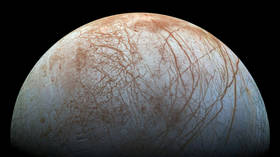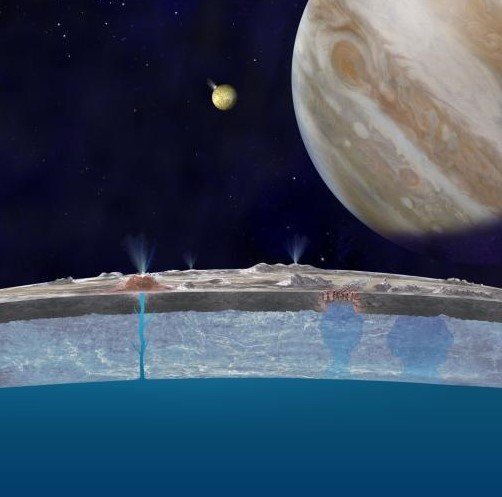Alien life could exist in vast salty ocean inside Jupiter’s icy moon Europa – study

New research has found that the enormous salty ocean inside Jupiter’s moon Europa could sustain life, raising the tantalizing prospect that alien lifeforms may exist below the icy surface.
Experts have long speculated that the waters of Europa may be habitable and a new study has finally added weight to the theory, discovering that the moon’s waters are likely not as acidic as was previously believed.
Scientists from NASA's Jet Propulsion Laboratory used data from the Galileo mission to create a computer simulation of the conditions on Europa and the physical characteristics of the vast subsurface ocean.

“Our simulations, coupled with data from the Hubble Space Telescope, showing chloride on Europa's surface, suggests that the water most likely became chloride rich,” explained lead researcher Mohit Melwani Daswani.
In other words, its composition became more like oceans on Earth. We believe that this ocean could be quite habitable for life.
The scientists found that ocean worlds such as Europa can be created through a process called metamorphism. This is a change in the structure of rocks that occurs when trapped water is released due to heating and increased pressure, likely through natural radioactive processes or tidal movement caused by Jupiter’s gravity.
The computer simulation indicated that the oceans of other moons, such as Europa's neighbor Ganymede, and Saturn's moon Titan, may also have formed by similar processes.
Also on rt.com Surf’s up? Planets with oceans likely far more common than we thought, says NASAEuropa is one of the largest moons in the solar system, and Daswani hailed it as “one of our best chances of finding life.” The team will continue to investigate Europa’s habitability ahead of NASA’s Europa Clipper mission which is due to launch in 2024.
The research was presented at the virtual 2020 Goldschmidt geochemistry conference this week but has yet to be peer-reviewed.
Like this story? Share it with a friend!













